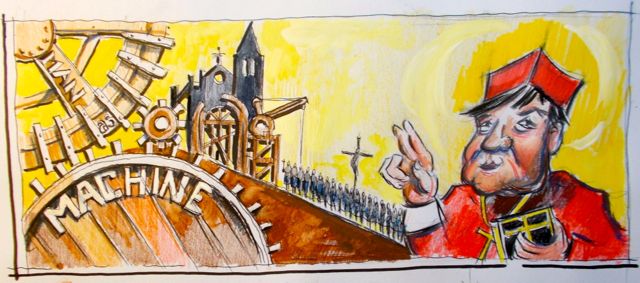TARQUIN O’FLAHERTY.
 In Britain, from 1814 to the 1820s, (the period of the Napoleonic Wars) unemployment was so great that those in control became fearful of revolution. The people, driven off their land by successive Enclosure Acts, now had no means whatever of providing for themselves so, unsurprisingly, isolated and sporadic food riots broke out. The British Government, in ‘enlightened’ response to this appalling threat of revolution (There had been, in recent times, revolutions in the New World and in France) forbade public meetings, and threatened to suspend tavern licences if they were shown to harbour ‘radicals’. Forbade ‘treasonous’ conversation, moved ‘suspicious’ people out of reading rooms and coffee houses and threatened the owners with closure. Even the mail was intercepted and examined for ‘sedition’.
In Britain, from 1814 to the 1820s, (the period of the Napoleonic Wars) unemployment was so great that those in control became fearful of revolution. The people, driven off their land by successive Enclosure Acts, now had no means whatever of providing for themselves so, unsurprisingly, isolated and sporadic food riots broke out. The British Government, in ‘enlightened’ response to this appalling threat of revolution (There had been, in recent times, revolutions in the New World and in France) forbade public meetings, and threatened to suspend tavern licences if they were shown to harbour ‘radicals’. Forbade ‘treasonous’ conversation, moved ‘suspicious’ people out of reading rooms and coffee houses and threatened the owners with closure. Even the mail was intercepted and examined for ‘sedition’.
Lord Sidmouth, Home Secretary in the government of “Mad King George’, had spies everywhere. They were more than that. These spies were expected to act as agent provocateurs, to act as double agents by infiltrating political or radical groups and then encouraging these groups to take direct action. The moment these poor unsuspecting people followed the agent’s urging to march or attend clandestine meetings, they would be set upon by soldiers and driven off, their leaders arrested, tried, imprisoned, or, very publicly, hanged. Lots of these unfortunates were transported for life to Australia.
The Americans nowadays literally invent enemy groups like El-Qaida so they can ‘protect’ us from them, much as Orwell’s OBrien did in ‘1984’. So the entire US military machine becomes an agent provocateur for their contemptible posturing.
A huge (1819) public gathering in Manchester, in St Peter’s Fields was set upon by soldiers, on horseback, with drawn sabres, slashing away. The crowd fought to escape the swords, trampling others into the ground. Eleven people were killed, most by sabre cuts and slashes, and literally hundreds were injured in the stampede. I n memory of Waterloo, this horror is remembered as ‘The Peterloo Massacre’.
Aghast at the slaughter, eminent people and politicians protested vigorously and were dismissed from their posts. The government shook the hands of the troops involved, praising their efforts, and promptly introduced even more repressive measures. A huge tax was introduced on newspapers, and penalties were cranked up against anything that might be interpreted as seditious. Famous periodicals like William Cobbett’s ‘Register’ or the equally well regarded ‘Black Dwarf’ were in real danger of failing. Possession ofTom Paine’s “Rights of Man’ was now an offence.
This situation could not be allowed to continue. The government, the old order, was treating people with contempt. Something had to be done.
TO BE CONTINUED

Pingback: Weekly Wrap 2 December 2013 | pcbycp